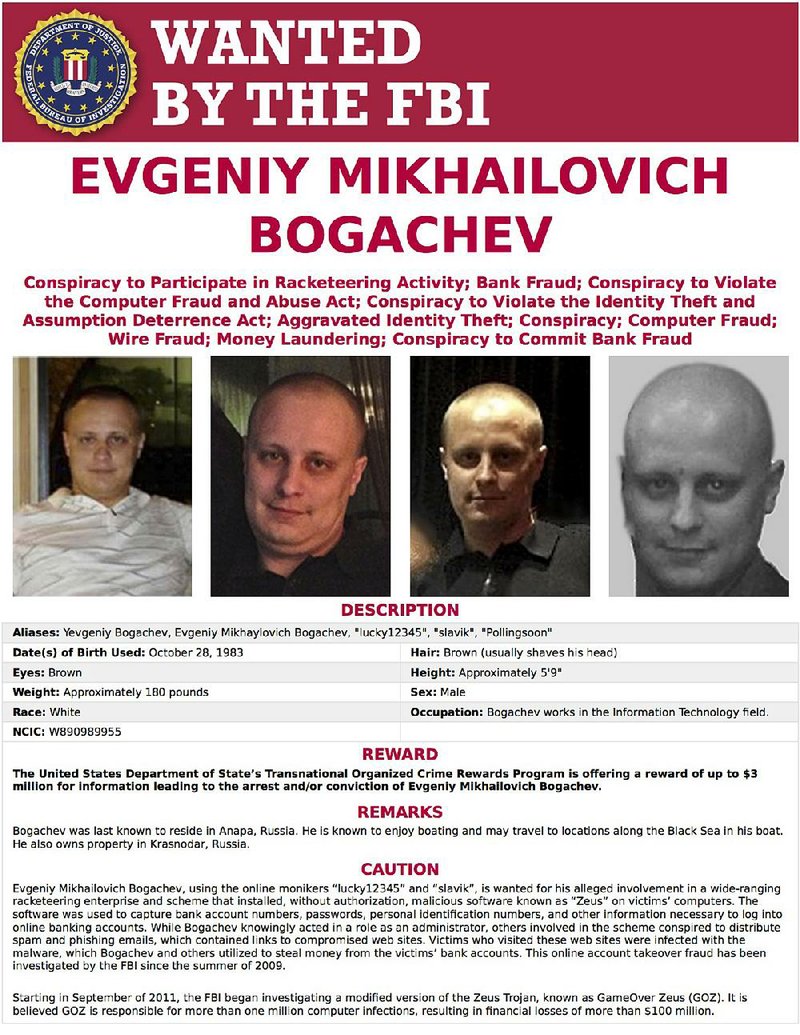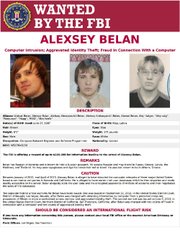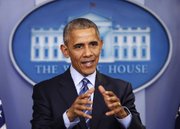WASHINGTON -- The White House struck back at Russia on Thursday for its efforts to influence the 2016 presidential election, ejecting 35 Russian diplomats from the United States and imposing sanctions on Russia's two leading intelligence services.
Included in Thursday's actions are sanctions against four top officers of the Russian military intelligence unit, who the White House believes ordered the attacks on the Democratic National Committee and other political organizations.
The U.S. also is expected to release evidence linking the cyberattacks to computer systems used by Russian intelligence officials. Taken together, Thursday's actions are the strongest U.S. response ever against a state-sponsored cyberattack aimed at it.
"All Americans should be alarmed by Russia's actions," President Barack Obama said in a statement Thursday. "These data theft and disclosure activities could only have been directed by the highest levels of the Russian government."
The U.S. said the 35 Russian diplomats it ejected were actually intelligence operatives. U.S. officials also shut down a pair of Russian compounds in New York and Maryland that they said were used for "intelligence-related purposes."
Obama said the actions were in response to an "unacceptable level of harassment" of U.S. diplomats in Moscow by Russian security services and police over the past year.
The new sanctions add to existing ones that the U.S. imposed over Russia's actions in Ukraine, which have impaired Russia's economy but had limited impact on President Vladimir Putin.
Obama and his staff have debated for months when and how to impose what they call "proportionate" sanctions against Russia. Several officials, including Obama and Vice President Joe Biden, have suggested that there also may be a covert response, one that would be obvious to Putin but not to the public.
"I think there is no doubt that when any foreign government tries to impact the integrity of our elections that we need to take action," Obama told National Public Radio. "And we will -- at a time and place of our own choosing. Some of it may be explicit and publicized; some of it may not be."
President-elect Donald Trump said in a brief statement that while "it's time for our country to move on to bigger and better things," he'll meet with intelligence officials next week "to be updated on the facts of this situation."
Republican House Speaker Paul Ryan and Senate Majority Leader Mitch McConnell welcomed the sanctions even as they leveled criticism at Obama for how he's dealt with Russia during his two terms in office.
"While today's action by the administration is overdue, it is an appropriate way to end eight years of failed policy with Russia," Ryan said in a statement. McConnell called the penalties against Russian intelligence services "a good initial step" and indicated that he would support a congressional review of the hacking.
Republican U.S. Sens. John McCain and Lindsey Graham, who've been critical of Trump, said they would lead an effort in Congress to impose even tougher penalties on Russia.
The Russian government denied it was behind the hacking and said it would announce today its response to Obama's move.
"We believe that these actions by the current administration have two goals: to completely ruin Russian-American relations, which have already hit bottom, and to undermine the foreign policy plans of the future administration and new president of the U.S.," Dmitry Peskov, a Kremlin spokesman, said during a conference call after the actions were announced.
U.S. officials have acknowledged that Trump could use his executive authorities to undo the sanctions and ejections. Peskov noted that Russian officials would keep that in mind when deciding how to respond.
"We are starting from the fact that these decisions were taken by President Obama, and Trump will be the head of state in three weeks," Peskov said. "Of course we'll take this factor into account."
Maria Zakharova, a Russian Foreign Ministry spokesman, took to Facebook to call the Obama administration "a group of foreign policy losers, angry and ignorant."
A detailed report
The Obama administration is planning to release a detailed "joint analytic report" from the FBI and the Department of Homeland Security that is based in part on intelligence gathered by the National Security Agency.
A more detailed report on the intelligence, ordered by Obama, will be published in the next three weeks, though much of the detail -- especially evidence collected from "implants" in Russian computer systems, tapped conversations and spies -- is expected to remain classified.
The administration had debated how much of its evidence to make public. Some officials inside the administration argued that even though the announcement might reveal sources and methods, it also would let other nations know that their activities can be tracked and exposed.
In the end, Obama decided to expand an executive order that he issued in April 2015 after North Korea hacked Sony Pictures Entertainment. Obama signed it in Hawaii on Thursday morning, specifically giving himself and his successor the authority to issue travel bans and asset freezes on those who "tamper with, alter, or cause a misappropriation of information, with a purpose or effect of interfering with or undermining election processes or institutions."
Obama used that order to immediately impose sanctions on four Russian intelligence officials: Igor Valentinovich Korobov, the current chief of Russia's Main Intelligence Directorate, and three deputies: Sergey Aleksandrovich Gizunov, the deputy chief of the intelligence agency; Igor Olegovich Kostyukov, a first deputy chief; and Vladimir Stepanovich Alekseyev, also a first deputy chief.
But the agency's officials rarely travel to the United States or keep their assets here, so the effects may be largely symbolic. It is also unclear if any U.S. allies will impose parallel sanctions on Russia.
The administration also imposed sanctions on three companies and organizations that it said supported the hacking operations: the Special Technologies Center, a signals intelligence operation in St. Petersburg; a company called Zor Security that is also known as Esage Lab; and the Autonomous Non-commercial Organization Professional Association of Designers of Data Processing Systems -- whose lengthy name, U.S. officials said, was cover for a group that provided specialized training for the hacking.
"It is hard to do business around the world when you are named like this," a senior administration official with long experience in Russia sanctions said Thursday morning of the trainers. The official spoke on condition of anonymity because of the sensitive nature of the intelligence.
Two Russians accused of commercial theft and fraud using computer networks also were hit with sanctions. Alexsey Belan and Evgeniy Mikhailovich Bogachev are on the FBI's "Most Wanted" list. The sanctions are designed to cut off their access to the international financial system.
The announcement of sanctions puts Trump in the position of having to decide whether to roll back the measures once he takes office.
White House officials suggested that building the case against Russia now would make it harder for Trump to ease the sanctions.
Trump has expressed skepticism that Russia was behind the hacking during the presidential campaign and election. In early December, Trump and his advisers mocked intelligence agencies for their conclusion that Russia was responsible for it.
"I think it's ridiculous. I think it's just another excuse," Trump said in an interview on Fox News Sunday several weeks ago. "I don't believe it."
On Twitter, Trump has raised doubts about Russia's involvement in the hacking. He asked on Dec. 15, "If Russia, or some other entity, was hacking, why did the White House wait so long to act? Why did they only complain after Hillary lost?"
In a Dec. 12 tweet, Trump asked, "Unless you catch 'hackers' in the act, it is very hard to determine who was doing the hacking. Why wasn't this brought up before election?"
Information for this article was contributed by David E. Sanger and Michael D. Shear of The New York Times; by Justin Sink, Nick Wadhams, Alan Katz, Chris Strohm, Nafeesa Syeed, Jennifer Epstein, Jake Rudnitsky and Henry Meyer of Bloomberg News; and by Josh Lederman, Tami Abdollah and Nataliya Vasilyeva of The Associated Press.
A Section on 12/30/2016



